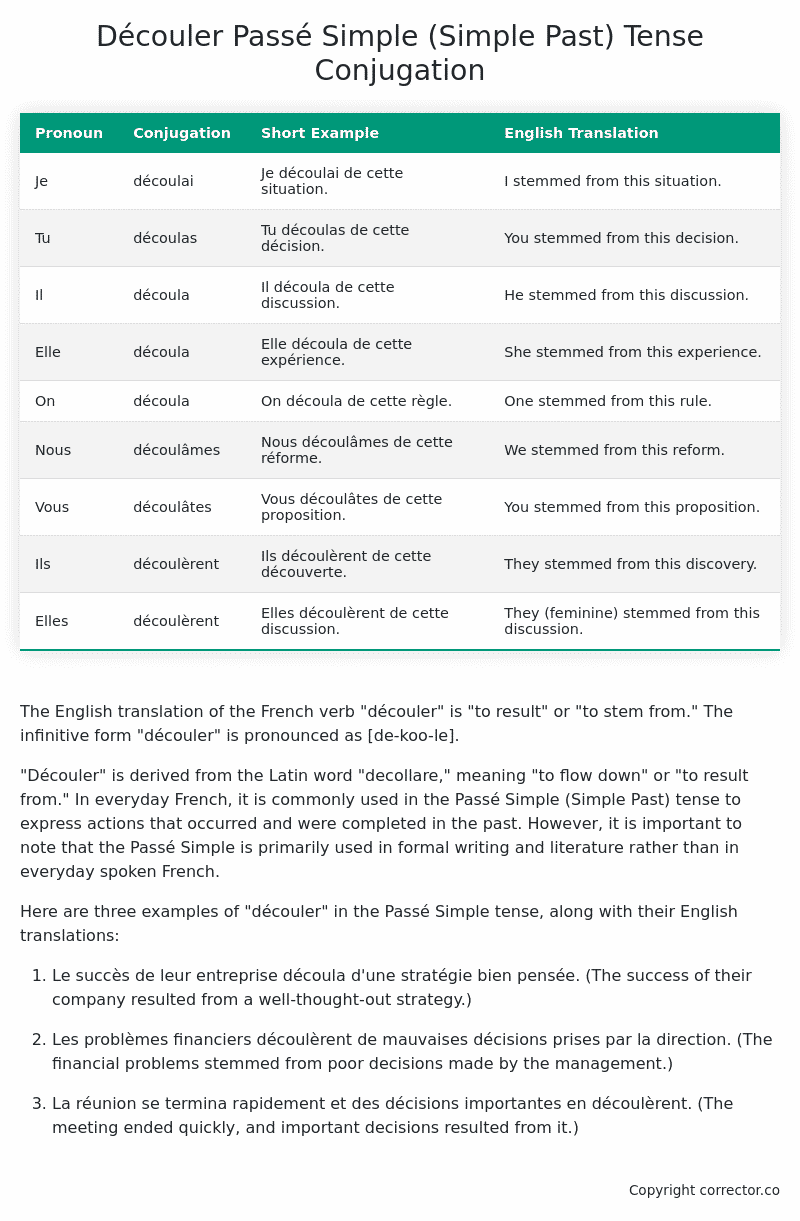Passé Simple (Simple Past) Tense Conjugation of the French Verb découler
Introduction to the verb découler
The English translation of the French verb “découler” is “to result” or “to stem from.” The infinitive form “découler” is pronounced as [de-koo-le].
“Découler” is derived from the Latin word “decollare,” meaning “to flow down” or “to result from.” In everyday French, it is commonly used in the Passé Simple (Simple Past) tense to express actions that occurred and were completed in the past. However, it is important to note that the Passé Simple is primarily used in formal writing and literature rather than in everyday spoken French.
Here are three examples of “découler” in the Passé Simple tense, along with their English translations:
-
Le succès de leur entreprise découla d’une stratégie bien pensée.
(The success of their company resulted from a well-thought-out strategy.) -
Les problèmes financiers découlèrent de mauvaises décisions prises par la direction.
(The financial problems stemmed from poor decisions made by the management.) -
La réunion se termina rapidement et des décisions importantes en découlèrent.
(The meeting ended quickly, and important decisions resulted from it.)
Table of the Passé Simple (Simple Past) Tense Conjugation of découler
| Pronoun | Conjugation | Short Example | English Translation |
|---|---|---|---|
| Je | découlai | Je découlai de cette situation. | I stemmed from this situation. |
| Tu | découlas | Tu découlas de cette décision. | You stemmed from this decision. |
| Il | découla | Il découla de cette discussion. | He stemmed from this discussion. |
| Elle | découla | Elle découla de cette expérience. | She stemmed from this experience. |
| On | découla | On découla de cette règle. | One stemmed from this rule. |
| Nous | découlâmes | Nous découlâmes de cette réforme. | We stemmed from this reform. |
| Vous | découlâtes | Vous découlâtes de cette proposition. | You stemmed from this proposition. |
| Ils | découlèrent | Ils découlèrent de cette découverte. | They stemmed from this discovery. |
| Elles | découlèrent | Elles découlèrent de cette discussion. | They (feminine) stemmed from this discussion. |
Other Conjugations for Découler.
Le Present (Present Tense) Conjugation of the French Verb découler
Imparfait (Imperfect) Tense Conjugation of the French Verb découler
Passé Simple (Simple Past) Tense Conjugation of the French Verb découler (You’re reading it right now!)
Passé Composé (Present Perfect) Tense Conjugation of the French Verb découler
Futur Simple (Simple Future) Tense Conjugation of the French Verb découler
Futur Proche (Near Future) Tense Conjugation of the French Verb découler
Plus-que-parfait (Pluperfect) Tense Conjugation of the French Verb découler
Passé Antérieur (Past Anterior) Tense Conjugation of the French Verb découler
Futur Antérieur (Future Anterior) Tense Conjugation of the French Verb découler
Subjonctif Présent (Subjunctive Present) Tense Conjugation of the French Verb découler
Subjonctif Passé (Subjunctive Past) Tense Conjugation of the French Verb découler
Subjonctif Imparfait (Subjunctive Imperfect) Tense Conjugation of the French Verb découler
Subjonctif Plus-que-parfait (Subjunctive Pluperfect) Tense Conjugation of the French Verb découler
Conditionnel Présent (Conditional Present) Tense Conjugation of the French Verb découler
Conditionnel Passé (Conditional Past) Tense Conjugation of the French Verb découler
Conditionnel Passé II (Conditional Past II) Tense Conjugation of the French Verb découler
L’impératif Présent (Imperative Present) Tense Conjugation of the French Verb découler
L’impératif Passé (Imperative Past) Tense Conjugation of the French Verb découler
L’infinitif Présent (Infinitive Present) Tense Conjugation of the French Verb découler
L’infinitif Passé (Infinitive Past) Tense Conjugation of the French Verb découler
Le Participe Présent (Present Participle) Tense Conjugation of the French Verb découler
Le Participe Passé (Past Participle) Tense Conjugation of the French Verb découler
Struggling with French verbs or the language in general? Why not use our free French Grammar Checker – no registration required!
Get a FREE Download Study Sheet of this Conjugation 🔥
Simply right click the image below, click “save image” and get your free reference for the découler Passé Simple tense conjugation!

Découler – About the French Passé Simple (Simple Past) Tense
Formation
Usage
Narration
Historical Context
Interactions with other tenses
Passé Composé
Imparfait
Conditional and Subjunctive
Summary
I hope you enjoyed this article on the verb découler. Still in a learning mood? Check out another TOTALLY random French verb conjugation!


